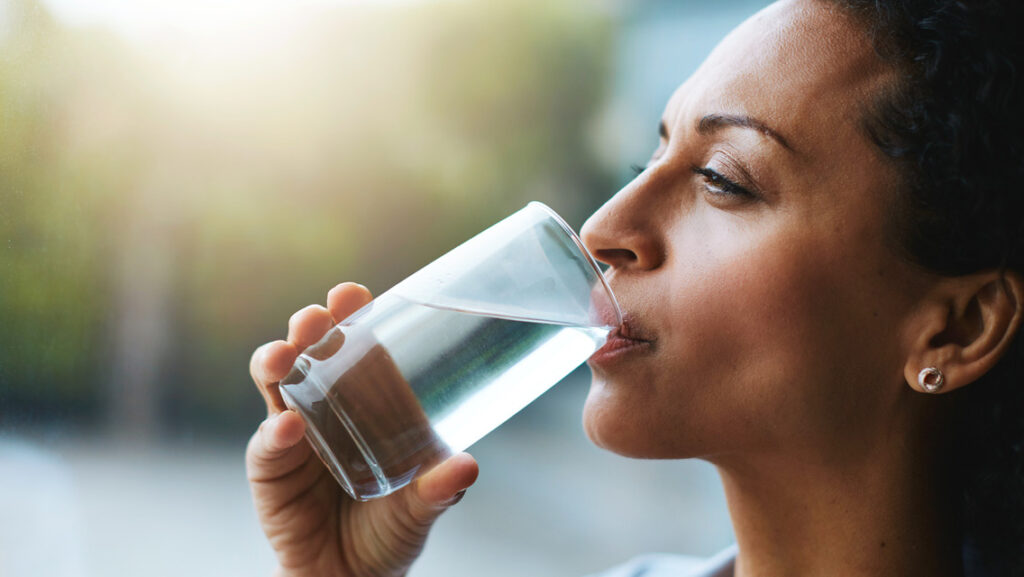This is part of a series.
Did you know that your body is made up of between 60-75% water? It’s no surprise that how much you drink can affect your health. Too much water could result in mineral imbalances, while too little could cause dehydration, headaches or fatigue.
How Much Should You Drink?
Bio-individuality applies not only to food but also to the amount of water our bodies need to function properly. On average, men should ingest about 3 liters (13 cups) and women about 2.2 liters (9 cups) of water each day1.
In order to satisfy individual needs, various lifestyle factors need to be taken into consideration. For example, the water content in fresh fruits and green leafy vegetables may increase hydration in the body.
- Water intake should be increased in the following situations:
- Hot/humid temperature
- High altitude (above 8,200 feet)
- High exercise level
- Illness of fever, diarrhea, vomiting
- Infections of the bladder or urinary tract
- Pregnancy/breastfeeding
- Increased use of diuretics (alcohol, coffee, black tea, even decaf, soda)
What About Other Fluids?
Broths and herbal teas are both therapeutic contributors to general hydration during a day because each will contain minerals and neither will be acidic or function as a diuretic unlike coffee, tea, alcohol, and soda.
On the other hand, all carbonated beverages, including seltzer, include dissolved carbon dioxide, creating carbonic acid which usually features a pH between 3 and 4 more acidic than most coffee actually. Clean, pure spring water would have a pH closer to 7 or 7.5.
So hence they are not the same, and carbonated water puts a pH balancing burden on the body and the average American’s diet is already very acidic. Clients should only consume one glass of seltzer at most per day and should not count it as a substitute for plain water.
Still Not Convinced About Hydration? Here are some facts that might be influential:
- The human brain is close to 3/4 water
- About 85% of our blood is water
- The average adult human loses from 2.5 to 3 Liters of water every day from urine, sweat/evaporation, stool, and breathing
- Water is a perfect conductor of electricity, and both our brain neural activity and cardiovascular activity require a fixed electrical circuit, based on stable concentration of electrolytes.
- Targeted levels of water are required in the body to allow toxins to leave our tens of trillions of cells and be excreted in our urine/stool. Otherwise, we suffer from toxic build-up, which leads to cellular dysfunction and eventually chronic disease, especially cancer.
What is the best type of water to consume?
Many types of water are available to us, including tap, bottled, filtered, distilled, and alkaline ionized water. Consumption generally depends on cost and availability, as not everybody has access to the best sources of water.
Tap water, although the most readily available, may not always be the safest option. Some cities have very good purification systems, while others leave traces of cholination by-products, lead and sometimes bacteria.
Research your city’s Consumer Confidence Report distributed every year by the Environmental Protection Agency to see if additional home purification is warranted. Water filters can help to remove contaminants when environmental toxins pose a threat to water systems. It is important to know which contaminants are present in your water in order to choose the right filter.
Distillation a process consisting of boiling water, has also been found to remove impurities and toxins. However, some believe the naturally occurring minerals in non-distilled water are beneficial to health.
Bottled water has become a popular option for individuals without access to safe tap water; however, there are growing concerns about chemicals from the plastic seeping into the water, as well as the effects that the increasing number of bottles is having on the environment.
Water-Ionizers are gaining more recognition for their ability to create alkaline ionized water through electrolysis, which may have certain health benefits.
1Dietary reference intakes for water, potassium, sodium, chloride and sulfate.Institute of Medicine.http://www.nal.usda.gov/fnic/DRI//DRI_Water/73-185.pdf. Accessed February 23, 2012.







